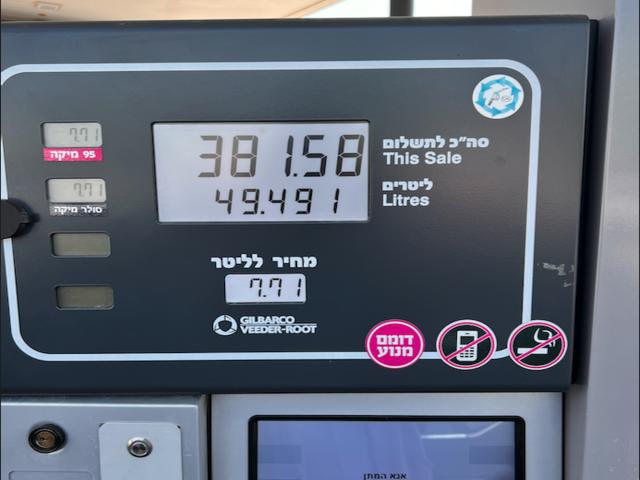Israel's gasoline prices are set to rise once again, marking a reversal after a brief respite in June. The Ministry of Energy and Infrastructure has announced that, effective midnight on Sunday, July 1, the maximum price for 95 octane gasoline at self-service pumps will increase by NIS 0.04 per liter, bringing the total to NIS 7.56 per liter.
This uptick follows a significant decrease of NIS 0.38 at the start of June, which came after five consecutive months of price hikes. In May, prices had peaked at NIS 7.90 per liter, just NIS 0.35 shy of the all-time high of NIS 8.25 per liter set in 2012.
Economic Factors Driving the Increase
Several factors are contributing to this rise in gasoline prices. During June, the Israeli shekel weakened against the US dollar, increasing the cost of importing oil. Since the beginning of 2024, the price per liter has surged by NIS 0.62. The government's cancellation of the excise tax reduction policy at the start of the year, intended to stabilize prices below NIS 7 per liter, has also played a significant role. This policy, which was in effect from April 2022 to December 2023, cost the state nearly NIS 2 billion.
Cost of Living in Israel:
— Ari Krauss (@AriKrauss) June 30, 2024
Price of gas will rise again at midnight. This is the 5 month out of 6 that the cost of gasoline will rise, after taking a brief break in June.
Thanks @netanyahu and @bezalelsm!https://t.co/WNjWr80VJi
Global Oil Market Trends
The rise in Israel’s gasoline prices coincides with a broader trend of increasing crude oil prices. West Texas Intermediate (WTI) crude oil has reached $82.11 per barrel, the highest since April 30 of this year, while Brent crude oil, the international benchmark, is trading at $86.72 per barrel, the highest in two months. U.S. oil prices have surged nearly 7% for June alone.
Geopolitical Tensions and Their Impact
The ongoing conflict between Israel and Hezbollah has significantly influenced global oil prices. The intensifying clashes are raising concerns about potential disruptions in crude oil supplies. Analysts warn that an escalation could lead to Hezbollah targeting Israel's offshore oil and gas operations, while Israel might retaliate against Iranian oil facilities. There is also the looming threat of Iran attacking oil tankers in the Strait of Hormuz, or abandoning its peace pact with Saudi Arabia to target the Kingdom's oil facilities.
🚨🇮🇷 🇮🇱 BREAKING: IRAN THREATENS ‘OBLITERATING WAR’ IF ISRAEL ATTACKS LEBANON
— Mario Nawfal (@MarioNawfal) June 29, 2024
The Iranian mission to the UN warned Israel that a full-scale attack on Lebanon would lead to a "war of annihilation."
Iranian Mission to the UN:
"Should it embark on full-scale military aggression,… pic.twitter.com/8DLUJ2j6FB
Inflation and Economic Indicators
Oil prices are also climbing in response to economic indicators in the United States. A key measure of U.S. inflation showed a 2.6% annualized rise in consumer prices in May, the slowest pace of growth in three years. Despite this, the upward trend in oil prices suggests traders are bracing for higher costs ahead, with some forecasting that crude oil prices could exceed $90 per barrel this summer.
Conclusion
As Israel braces for another increase in gasoline prices, the interplay of local economic policies, global oil market trends, and geopolitical tensions underscores the complexity of the situation. The potential for further disruptions in oil supplies due to conflicts in the Middle East remains a significant concern, suggesting that both consumers and policymakers must stay vigilant in the months ahead.


